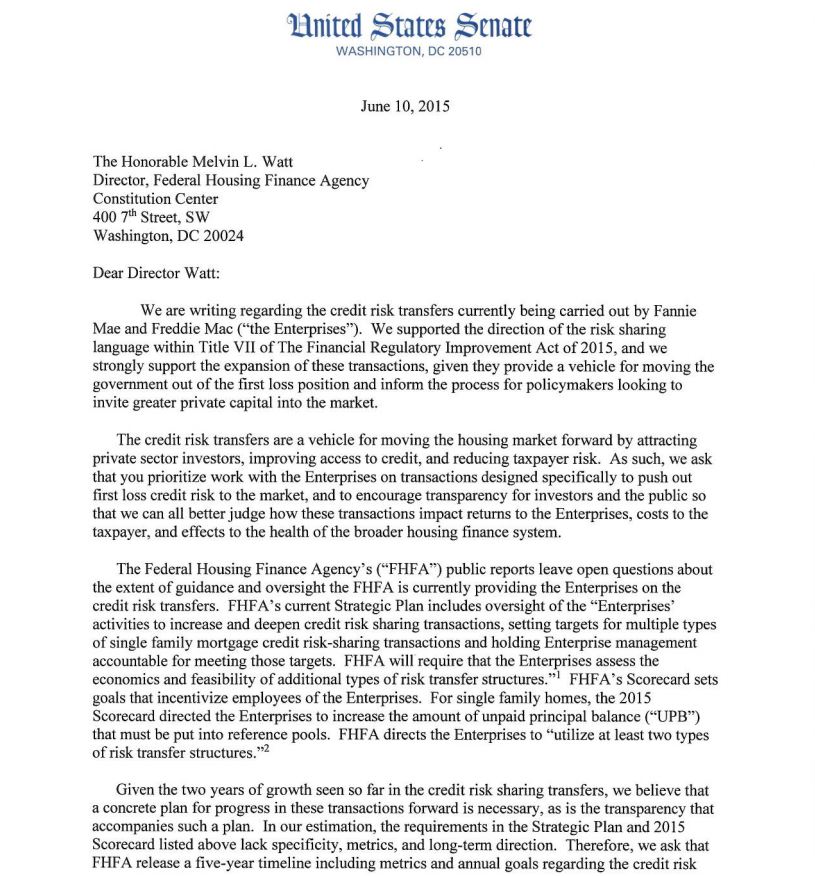USMI president Lindsey Johnson recently sat down for a Q&A discussion on risk sharing with DS News. Below is a portion of her discussion.
Lindsey Johnson currently serves as U.S. Mortgage Insurers (USMI) President and Executive Director. Johnson previously served as a Director on PwC’s public policy team, where she engaged policymakers on key public policy issues that impacted the firm. Prior to joining PwC, Lindsey was a former member of the Senate Banking Committee staff as the Minority Staff Director for the Senate Banking Committee’s National Security and International Trade and Finance (NSITF) Subcommittee, and served as Senior Policy Advisor to Senator Mark Kirk (R-Illinois), focusing on noteworthy banking, housing finance reform, and insurance legislation.
What is the difference between front-end risk sharing and back-end risk sharing?
The biggest difference is the fact that upfront risk sharing transactions de-risk the GSEs, or transfer the credit risk from the loans, before they hit the GSE’s balance sheets. Back-end CRTs require the GSEs to warehouse that risk for a period of time, and the GSEs decide what credit risk they’re going to offlay and who the counterparties will be. USMI members have done both, so we would not say that back-end transactions are bad. We actually are very supportive. However, one of the drawbacks or distinctions between the two, specifically back-end CRTs, is that the risk is on the balance sheets on the GSEs is subject to credit swings, which is partially what happened with the widening of the credit spreads at Freddie Mac last month when they experienced a loss.
Other challenges and drawbacks to the back-end transactions is that there is not a lot of pricing transparency to date. Also, smaller institutions have not been able to participate in the transactions. Front-end transactions provider a lot greater pricing transparency and can be accessible for the vast majority of lenders of all types and sizes, so that’s one of the benefits of front-end transactions.
Why do you think the GSEs have engaged in mostly back-end risk sharing to this point?
The FHFA reported in their white paper back in August that since 2012, the GSEs have purchased approximately $3 trillion in mortgage loans, of which just over around 20 percent of the loans—about $667 billion in unpaid principal balance—has been transferred via riskshare, but out of that, less than 1 percent of the risk has been transferred via front-end risk sharing. I think part of the reason, and it’s pretty understandable if this is the case, is that the GSEs can control the process in the entire back-end transfer process. Especially when you consider early versions of STACR (Structured Agency Credit Risk) and CAS (Connecticut Avenue Series) transactions, where they were really designed to move large portions of unexpected loss from the GSEs balance sheet, it makes sense because they were experimenting in the beginning.
Today, the GSEs are a lot better at risk transfer. The products and the markets themselves have started to evolve, and the GSEs are starting to transfer both expected loss and catastrophic loss. The products have evolved and the market players themselves are able to transfer this risk pretty seamlessly. It’s becoming a part of their everyday routine. So at least in the beginning, it seems, they were experimenting and trying to control the entire process.
Now that we have a much better sense of how this works operationally and how credit risk transfer can work both on the back end and the front end, I think we should start focusing on transactions that are scalable and repeatable just as FHFA continues to say they want to do. Also, they should lay the groundwork for a system that is accessible to a majority of market players. It doesn’t make sense to return to a system that advantages some market players over others. Knowing that comprehensive housing finance reform isn’t coming in the near term, we think it’s imperative that FHFA and the GSEs adhere to principles that nearly every industry and consumer group, as well as policy makers, have said are really critical to the housing finance system going forward. They need to begin laying the groundwork now. Those principles are very broad, of course: having greater private capital, which they are very focused on; greater transparency on pricing, and demonstrating the impact to the borrower; and then equitable access for smaller lenders, and lenders of all sizes and types in mortgage finance. So having a greater balance of front-end transactions is something that we are really pushing FHFA and the GSEs to experiment with in 2016.
To read the entire Q&A discussion with USMI president Lindsey Johnson click here














